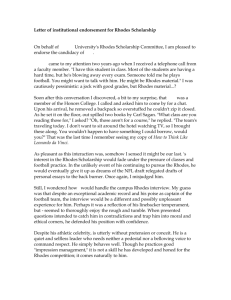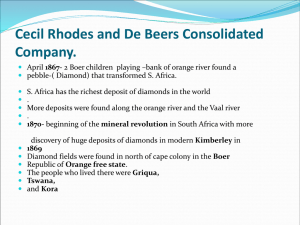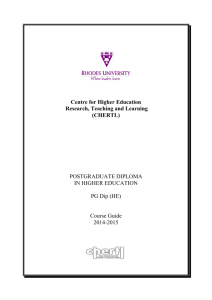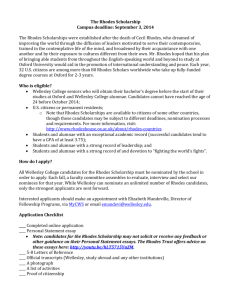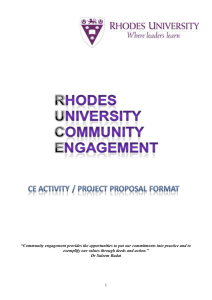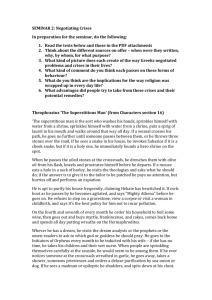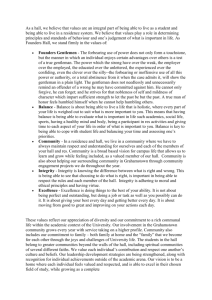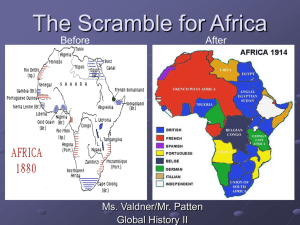Purpose - Rhodes University
advertisement
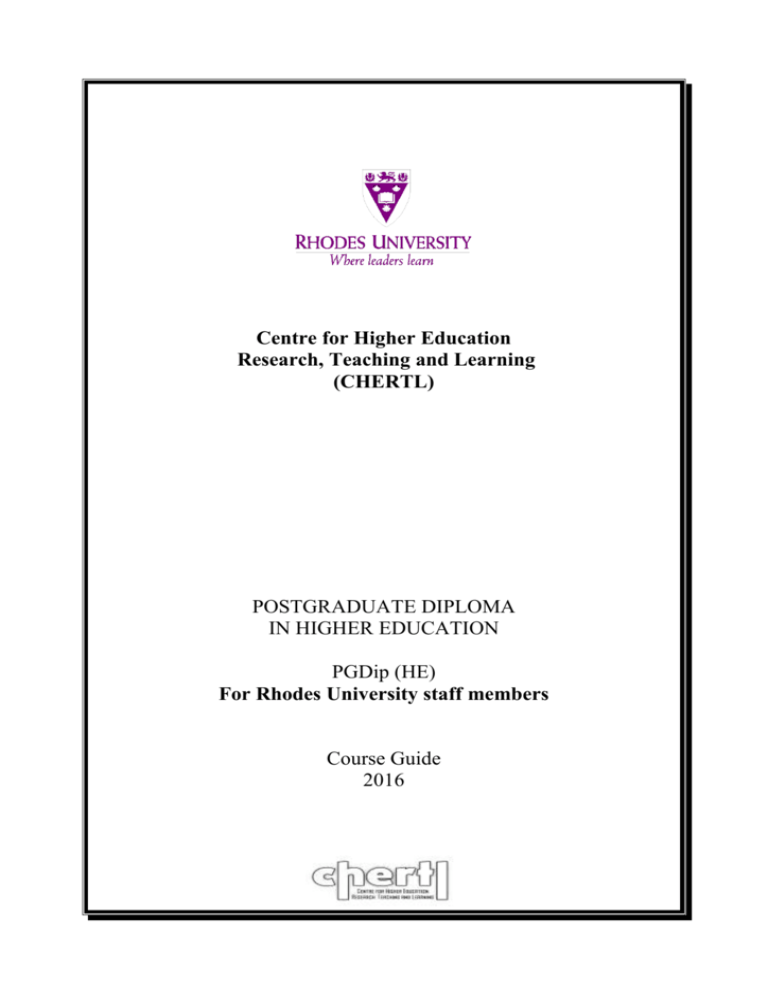
Centre for Higher Education Research, Teaching and Learning (CHERTL) POSTGRADUATE DIPLOMA IN HIGHER EDUCATION PGDip (HE) For Rhodes University staff members Course Guide 2016 © CHERTL, Rhodes University, Grahamstown 2015 2 POSTGRADUATE DIPLOMA IN HIGHER EDUCATION (PGDip (HE)) Table of Contents 1. Purpose of the course 2 2. PGDip (HE) and the HEQSF 2 2.1 Entrance level requirements 2 3. Nature of the course 3 4. Time commitment 4 5. Assessment of the course 4 6. Registration 5 7. Recognition of prior learning (RPL) 6 8. Exit level outcomes for the PGDip (HE) 6 9. Structure of the course 6 Module 1: Learning and teaching in higher education 7 Module 2: Curriculum development 8 Module 3: Assessment of and for student learning 8 Module 4: Evaluation of teaching and courses 9 10. Materials for the course 13 11. Facilitators of the course 14 12. Contact details 17 Appendix 1: Portfolio assessment criteria 18 Appendix 2: 22 Appendix 3: Critical cross-field education outcomes © CHERTL, Rhodes University, Grahamstown 2015 23 1 1. Purpose of the course The purpose of the Postgraduate Diploma in Higher Education (PGDip (HE)) is to facilitate the professional development of lecturers as reflective practitioners in higher education by developing their knowledge of Higher Education (HE) as a field of study. The programme is designed to assist lecturers to enhance their ability to facilitate, manage and assess students’ learning, and provide professional accreditation for HE practitioners. The purpose of the Postgraduate Diploma in Higher Education is to facilitate the professional development of lecturers as reflexive practitioners in higher education by developing their knowledge of Higher Education (HE) as a field of study. The programme is designed to assist lecturers to enhance their ability to facilitate, enhance and assess students' learning, and provide professional accreditation for HE practitioners. Shifts in higher education around massification, globalisation and the discourse of 'high skills' have brought a changed workplace for academics in which we have to negotiate new expectations, identities and challenges. Whilst these changes are international, they have particular nuances and urgency in the South African context where historical disadvantage, social justice, decolonisation and transformation are challenges to be addressed. This course aims to contribute towards lecturers' ability to respond to these challenges and to meet the real learning needs of their students. 2. PGDip (HE) and the HEQSF The Diploma is registered as a 120 credit honours level (level 8) course on the Higher Education Qualifications Sub-Framework (HEQSF). Rhodes University is a registered provider for the course and the qualification is awarded by the Rhodes Education Faculty. Participants must complete normal registration procedures through the Faculty of Education at the beginning of each year. 2.1 Entrance level requirements Lecturers applying for the course must normally hold at least a Bachelor’s degree or equivalent and should preferably have a minimum of one year’s higher education teaching experience (at time of registration). Course participants must be proficient in both oral and written formal English. Participants must be computer literate and have reliable access to the Internet to ensure access to the on-line Learning Management System (RUconnected) and other online learning platforms used to support the teaching and learning experience. 2.2 Structure of the Diploma In order to obtain the qualification participants are required to meet the outcomes of four compulsory modules and one elective module. 1. Learning and teaching in Higher Education 2. Curriculum development © CHERTL, Rhodes University, Grahamstown 2015 2 3. Assessment of and for student learning 4. Evaluation1 of teaching and courses 5. Elective Modules 2,3 & 4 have been designed to support lectures in fulfilling the requirements of the Rhodes University policies on teaching and learning. Elective module: Research in Higher Education Participants are required to choose an area of their practice for specific investigation. For example: 1. 2. 3. 4. 5. 6. 7. 8. Design and implement eLearning Design and implement experiential learning Supervision of research in Higher Education Leadership in Higher Education Internationalisation in Higher Education Research elective Design and implement Service-Learning Social inclusion in Higher Education (e.g. integrating HIV-Aids, race and gender issues etc. into the curriculum) The elective module is to be completed through self-study although CHERTL staff members are available to assist participants. 3. Nature of the course In developing the course, the concern has been to: focus on work-based learning, i.e. lecturers' everyday practice allow the teaching portfolio to be used as a means of assessing participants' attainment of the learning outcomes set for the course allow prior learning to be accredited recognise the capacity of participants to work as independent and mature students. The term ‘evaluation’ is used to denote discerning the quality of teaching and courses, while ‘assessment’ refers to the processes related to the judgement of and for student learning. 1 © CHERTL, Rhodes University, Grahamstown 2015 3 Some of the key features in the programme are2: critical engagement with the field of higher education critical engagement with the role and practice of the lecturer in their teaching context rather than to "teach" them a set of generic skills or techniques to develop contexts in which lecturers meet to draw upon the insights that their different disciplines offer to issues of teaching and learning to help lecturers to consider not only disciplinary knowledge but also theory regarding the way students construct that knowledge to help lecturers to develop strategies for encouraging active learning to encourage lecturers to take into account issues of transformation, diversity and social inclusion to encourage lecturers to be cognisant of, and take into account in their teaching, students language and literacy needs to encourage reflection on the processes that take place in the PGDip (HE) group and to consider how they may provide a model for lecturers' work with their students to offer lecturers opportunities to experience the use of ICTs in teaching and learning. 4. Time commitment Participants are required to attend all contact sessions. Classes are one and a half hours to two hours long and are held weekly during term time. Session times are scheduled in consultation with participants. Between sessions participants will be required to complete readings and tasks and to participate in discussion forums via various elearning platforms. RUconnected is used to manage the readings and tasks designed to help participants to meet programme outcomes. Participants will be required to complete tasks and engage with set readings before sessions. In addition, they will be asked to keep an on-line reflective document in which they reflect on the processes that occur during the sessions and in which they self-assess how what they learn influences their practice. As the course is work-based, lecturers’ normal teaching practice is regarded as part of their reflective learning in the course. Participants are expected to engage in self-directed learning and to use their own initiative in sourcing material relating to teaching and learning in their disciplines. 5. Assessment of the course The course as a whole will be assessed by means of an integrated teaching portfolio. Participants will be required to submit an assignment on completion of each module. The submission of these assignments constitutes a DP requirement for the course. The objective of the assignments is to provide formative assessment to support the participants in the building of the teaching portfolio and meeting the outcomes of the qualification. 2 Adapted from and based on, Rowland, S (2000), The Enquiring University Teacher. The Society for Research into Higher Education & Open University Press: Buckingham. © CHERTL, Rhodes University, Grahamstown 2015 4 Appendix 1 contains a list of criteria that are appropriate to the purpose, exit level outcomes and HEQSF level of the PGDip (HE) qualification. Appendix 2 relates to the grade descriptors used in the summative assessment of the portfolio. Participants are urged to make use of the opportunities for formative assessment on written work offered by CHERTL staff members. Those participants not choosing to Participants are required to submit two suitably bound hardcopies as well as an electronic (PDF) copy of their Teaching Portfolios by the middle of January 2017 in order to graduate in April 2017. The portfolio will be subject to internal, as well as external, examination. A defence of the portfolio may be required. 6. Registration 6.1 PGDip (HE) Application forms for the PGDip (HE) can be accessed from the Rhodes University webpage or via this link: http://www.ru.ac.za/media/rhodesuniversity/content/registrar/documents/forms/PG%20Dip% 20(HE)%20application%20form%20Form_2015%20.docx Those who have not studied formally at Rhodes Univesrity, the completion of this additional form is required: http://www.ru.ac.za/media/rhodesuniversity/content/registrar/documents/forms/2015%20Exte rnal%20Hons%20Applications.pdf Please be sure to complete these electronically, and email copies to the course coordinator (d.belluigi!@ru.ac.za and the administrator (n.siqwede!ru.ac.za). The qualification is designed to be completed over the course of two years. If participants are unable to submit a Teaching Portfolio for summative assessment by the middle of January 2018, they are required to apply to the Dean of Education for an extended DP to enable them to submit the following year. Rhodes lecturers who register for PGDip (HE) are not required to pay course fees. However, as the course draws a government subsidy, if the course is not completed within three years, participants will be required to reimburse the University. Participants from other institutions are required to pay course fees as outlined in the Rhodes University Schedule of Fees which is published each year. 6.1 MEd MEd participants are required to register as per the Rhodes University Calendar (both academic and administrative registration). MEd participants are reminded that they are required to re-register at the start of each academic year for the duration of the qualification. © CHERTL, Rhodes University, Grahamstown 2015 5 Prior to initial registration, participants are required to discuss supervision of the research component of the qualification with the CHERTL MEd co-ordinator. MEd participants who are employed in full time, permanent positions by the University are entitled to apply for the normal staff rebate on academic fees. It is highly recommended that MEd participants attend the Research Design course offered by the Education Faculty prior to embarking on the research component of the qualification. Your portfolio will be assessed at a different level to the PGDIp (HE) participants, though you will participate in the weekly sessions with those participants as your peers. 7. Recognition of prior learning (RPL) Since the focus of the PGDip (HE) is on the ability of participants to demonstrate outcomes, lecturers with previous teaching experience could elect to prepare a teaching portfolio without following the formal programme. This portfolio could then be submitted for assessment and the Diploma awarded if assessment criteria are met. Portfolios submitted for Diploma purposes would be subject to external, as well as internal, examination. A defence of the portfolio may be required. 8. Exit level outcomes for the PGDip (HE) As a result of engaging with the course processes and materials participants should be able to: 1. 2. 3. 4. 5. 6. 7. Evaluate the influence of the higher education context (at global, national, regional, institutional and disciplinary levels) and apply insights to their professional practice Provide evidence of teaching practices that respond to the need for social justice and transformation in the South African context Use critically reflective practice to examine and develop their teaching and learning activities Use theoretical understandings of the nature of learning and teaching in higher education to facilitate student learning in their disciplines Use relevant theory to inform the design, interpretation and implementation of higher education curricula Use relevant assessment theory and principles to implement assessment of student learning in higher education Use relevant theory to design and implement evaluation of teaching and courses in higher education 9. Structure of the course © CHERTL, Rhodes University, Grahamstown 2015 6 COMPULSORY MODULES CREDITS 1. Learning and teaching in higher education 40 2. Curriculum development 30 3. Assessment of and for student learning 30 4. Evaluation of teaching and courses 10 5. Elective 10 Total 120 The section that follows outlines the purposes and outcomes for each module. Participants will receive a document for each module containing detailed information regarding session programme, module assignment, assessment criteria, list of references, etc. Module 1: Learning and teaching in higher education Purpose The purpose of this module is through participants’ reflection and critical practice to: deepen their theoretical understanding of the nature of learning in higher education gain a practical understanding of ways in which to facilitate students' access to learning in the various disciplines in higher education Credits: 40 Specific Outcomes As a result of engaging with the course processes and materials participants should be able to: 1. describe their approach to teaching and learning as part of the development of their teaching philosophy 2. contextualise their teaching and their students’ learning within the changing higher education context 3. mediate and facilitate the initiation of students into their discipline 4. recognise and respond to student diversity 5. use interactive teaching methods to encourage active learning 6. facilitate the holistic development of students within the context of a teaching and learning environment © CHERTL, Rhodes University, Grahamstown 2015 7 7. use multiple resources to mediate and facilitate learning successfully Module 2: Curriculum development Purpose The purpose of this module is to increase participants’ theoretical understanding of the different approaches to curriculum development in higher education and to enable them to design, interpret and implement curricula within an outcomes-based framework. Credits: 30 Specific Outcomes As a result of engaging with the course processes and materials participants should be able to: 1. critically analyse and evaluate the approach to curriculum development used in own practice 2. critically analyse and reflect on the global, national, regional and institutional HE contexts in order to inform curriculum decisions 3. use theories and concepts from the higher education literature to critically analyse and evaluate their curriculum development practices 4. use insights from curriculum theory and contextual understandings to (re)design courses/modules which are aligned with outcomes and which enable epistemological access for students. Module 3: Assessment of and for student learning Purpose The purpose of this module is to develop participants’ theoretical understanding of assessment and to enable the informed implementation of assessment principles and processes into their practice. Credits: 30 Specific Outcomes As a result of engaging with the course processes and materials participants should be able to: 1. align their assessment practices with specific outcomes set for the course 2. use assessment to make valid and reliable judgements about students’ performance 3. respond appropriately to diversity within their assessment practices © CHERTL, Rhodes University, Grahamstown 2015 8 4. use continuous assessment in a manner which promotes learning 5. use a range of approaches to enhance assessment (for example, self, peer, group, computer assisted assessment) 6. use a range of appropriate methods of assessment (for example, essays, tests, projects, portfolios, etc.) 7. plan and implement assessment and moderation processes informed by national and institutional guidelines and policies. Module 4: Evaluation3 of teaching and courses Purpose The purpose of this module is to engage with the theories and principles of evaluation in higher education thus enabling participants to evaluate their own practice as educators. Credits: 10 Specific Outcomes As a result of engaging with the course processes and materials participants should be able to: 1. use critically reflective practice to examine and develop their teaching and courses 2. articulate their beliefs and values in relation to evaluation practices 3. integrate knowledge gained from the literature on evaluation into their practice 4. use national and institutional policies on evaluation to inform evaluation and quality assurance practices 5. select and implement appropriate methods for eliciting students’ perceptions of teaching and courses 6. engage in peer review processes 7. analyse data gained from a number of sources and use the results to enhance and develop all aspects of their practice 3 We use the term "evaluation" to describe all the activities which a lecturer engages in to examine his/her own practice whereas we use "assessment" to describe ways in which lecturers judge the worth of their students' work. © CHERTL, Rhodes University, Grahamstown 2015 9 8. document evaluation processes in a way that is accessible to others. Module 5: Research elective Credit: 10 Purpose The purpose of the elective module is to enable participants to select an area of their practice for specific investigation. Details need to be negotiated in advance with the Course Coordinator. The following are examples of electives to consider: Design and Implement eLearning Purpose The purpose of this module is to enable participants to design and develop eLearning resources (content and activities). Learning Assumed to be in Place Participants entering this module should have keyboard and mouse skills, be able to manage files, do word processing, communicate electronically (log onto a network, send a message, search and retrieve data from the Internet), have an elementary familiarity with HTML editors, have the ability to upload and download files from the Web, and be able to manipulate graphics. Note: Participants should have reliable access to a computer connected to a network with access to the Internet. Specific Outcomes Participants will be able to: © CHERTL, Rhodes University, Grahamstown 2015 10 1. contextualise eLearning as a delivery mode within their own disciplines, departments and/or learning units 2. design and develop effective eLearning resources (content, processes and activities) 3. select and use appropriate tools available in a learning management system (LMS) 4. evaluate processes and products of eLearning. Design and Implement of Experiential Learning Purpose To enable participants to design and implement experiential learning that is integrated into the curriculum. Specific Outcomes Participants will be able to: 1. analyse the outcomes for a specified course and identify those outcomes that can best be acquired through experiential learning (with reference to theory on experiential learning) 2. design, structure and implement an experiential learning event to facilitate the attainment of these outcomes 3. integrate values and ethics relevant to the workplace into the learning experience where appropriate 4. integrate experiential learning with classroom learning and monitor the integration on a continuous basis. Postgraduate Supervision Purpose The purpose of this module is to enable participants to guide students in the understanding, planning, designing, management and writing up of research projects. Participants will develop the competence to assess and moderate research products. Participants who register for this module must be involved in or have experience of supervising postgraduate students. Specific Outcomes Participants will be able to: 1. guide students to acquire the knowledge and skills to conduct research 2. guide students to identify, plan and design a research project 3. monitor the quality of the research process and product in line with institutional policy © CHERTL, Rhodes University, Grahamstown 2015 11 4. support students in the research process 5. assess research reports 6. evaluate their own supervision. Leadership in Higher Education Purpose The purpose of this module is to enable participants to explore the processes and implications of academic leadership in higher education4. Specific outcomes Participants will be able to: 1. articulate the roles and responsibilities of a university / departmental leadership position 2. reflect on and respond to the challenges inherent in academic leadership within their context 3. document the processes involved in the leadership role 4. evaluate their leadership role in relation to institutional and/or departmental requirements Internationalisation in Higher Education Purpose The purpose of this module is to equip lecturers with the background knowledge and the competencies that will enable them to internationalise their curricula and to play a role in the process of internationalisation at the University. Specific outcomes Participants will be able to: 1. articulate issues, debates and theories in internationalisation, globalisation, Africanisation and cultural diversity, and to defend their own views 2. design new curricula or adapt existing ones to satisfy accepted criteria for a fully internationalised curriculum. 4 For example, heads of department, course, tutorial, practical programme co-ordinator, curriculum review coordinator, etc. © CHERTL, Rhodes University, Grahamstown 2015 12 Design and Implement Service Learning Purpose The purpose of this course is to enable participants to enable participants to develop, facilitate and assess Service Learning within their disciplines. Specific outcomes Participants will be able to: 1. identify areas of the curriculum that are appropriate for the implementation of Service Learning. 2. design appropriate Service Learning teaching and learning activities. 3. facilitate the integration of reflective learning within a disciplinary context. 4. design appropriate assessment tasks that integrate reflective and disciplinary learning 5. evaluate a Service Learning component of the curriculum. Social Inclusion in the Curriculum Purpose The purpose of the course is to enable participants to examine the nature of social inclusion and exclusion in HE and to examine the relationship between physical and epistemological access. In addition, participants will examine various mechanisms for facilitating epistemological access to HE. Specific outcomes Participants will be able to: 1. 2. 3. critically examine the notion of social inclusion. identify and examine the factors that impact on social inclusion in HE consider ways in which epistemological access can be enhanced within the context of his/her institution or discipline. 10. Materials for the course The facilitators will, for each module, provide participants with a few core readings as well as a reading list for those who are interested in pursuing certain topics. The readings are provided in order to give participants an opportunity for criticism, a perspective against which they can try out their own ideas, rather than a basic knowledge that the course aims to “teach". © CHERTL, Rhodes University, Grahamstown 2015 13 Recommended texts Biggs, J. & Tang, C. (2011). Teaching for quality learning at university: what the student does. 4th edition. McGraw-Hill/SRHE/OUP: Maidenhead. Brockbank, A. & McGill, I. (1999). Facilitating Reflective Learning in Higher Education. Open University Press: Buckingham. D'Andrea, V. & Gosling, D. (2005). Improving teaching and learning in higher education. A whole institution approach. Berkshire, Society for Research into Higher Education and Open University Press. Gravett, S. & Geyser, H. (eds). (2004). Teaching and Learning in Higher Education. Van Schaik: Pretoria. Hunt, L & Chalmers, D. (eds). (2013). University teaching in focus: A learning-centred approach. 2nd edition. Routledge: Abingdon. Leibowitz, B., Van der Merwe, A. & Van Schalkwyk, S. (eds). (2009). Focus on First-Year Success. Perspectives emerging from South Africa and Beyond. Sun Press: Stellenbosch. Makoni, S. (Ed.). (2000). Improving Teaching and Learning in Higher Education: A Handbook for Southern Africa. Witwatersrand University Press: Johannesburg. Ramsden, P. (1992). Learning to Teach in Higher Education. Routledge: London. Toohey, S. (1999). Designing courses for higher education. OUP: Philadelphia. Additional resources and reference lists will be made available via the Learning Management System. 11. Facilitators of the course There are no 'best practices' in teaching; no fixed data of evidence. All is open to interpretation and re-interpretation as contexts shift and as we learn from further experience and reflection. This is why anyone committed to enquiring into their teaching will be suspicious of those claiming to bring solutions (Rowland 2000:98). The course will be facilitated by members of the Rhodes Centre for Higher Education Research, Teaching and Learning (CHERTL). People from outside of the CHERTL may be invited to facilitate sessions. PGDip (HE) course facilitators: © CHERTL, Rhodes University, Grahamstown 2015 14 Jo-Anne Vorster J.Vorster@ru.ac.za Jo-Anne has been working in the field of Academic Development since 1992. She has been involved in the curriculum development and teaching of the PGDip (HE) since its inception. She also works in the areas of teaching and course evaluation, assessment and curriculum and teaching development. Jo-Anne’s Master’s degree was in Psychology in the area of collaborative learning processes. She completed her PhD in 2009. It is entitled: ‘A social realist analysis of collaborative curriculum development in an academic department at a South African university”. She is interested in the roles of knowledge and identity curriculum development, academics’ learning on formal courses on teaching, and formal programmes for inducting the next generation of academic developers. Jo-Anne is co-ordinator for the PGDip (HE) for the national course. Amanda 'Mandy' Hlengwa a.hlengwa@ru.ac.za Mandy has worked in the field of Academic Development since 2004. She co-ordinated Durban University of Technology's Extended Studies for three years before joining Rhodes University's Centre for Higher Education Research Teaching and Learning (CHERTL). Since joining the centre, she has focused her attention on Community Engagement in the higher education context with a specific focus on service-learning. Mandy's interest on disciplinary knowledge and the impact on curriculum infusions was the topic of her PhD entitled "An exploration of conditions enabling and constraining the infusion of service-learning into curriculum at a South African research led university". Dina Zoe Belluigi d.belluigi@ru.ac.za Dina Dinahas hasbeen a Masters researching in Higher a range Education of areas, degree primarily for which from she assessment researchedto theevaluation. relationship Herbetween Mastersassessment, in Education and thesis espoused explored and the hidden disjunctions curricula. between Her current the espoused areas of and interest the practiced include the in critical the case studied, rethinking considering of evaluation issuesprocesses of student within agency, higher intentionality education,and student ethical agencyrelations and authorship, betweenassessors’ teacher and interpretative student. In addition, frameworks, she has and particular curricula interest of creative in teaching arts disciplines, and learning which infeed the creative into her arts disciplines. consultations Herwith doctorate, fellow through academics. Kingston Dina also University has a Masters (UK), looks in Fine atArt interpretative and previously frameworks taught Fine utilised Art Studio in assessment, Practice.toShe what is currently extent these reading consider towards student her PhD intentionality, at Kingstonand University, their significance UK. for student experiences. Her current areas of interest include the critical rethinking of evaluation processes within higher education, student agency and authorship, assessors’ interpretative frameworks, and curricula of creative arts disciplines, which feed into her consultations with fellow academics. Dina also has a Masters in Fine Art and previously taught Fine Art Studio Practice. © CHERTL, Rhodes University, Grahamstown 2015 15 Lynn Quinn L.Quinn@ru.ac.za Lynn is Head of Department of CHERTL. She has been involved in the field of Academic Development since 1995. Her first career was as a high school English teacher. When she first started working in the CHERTL her work mainly involved supporting students in terms of academic writing. Her MA research project focused on students' writing in HE. From 1999 CHERTL at Rhodes began to focus more on academic staff development. 2000 saw the introduction of the first version of the Postgraduate Diploma in Higher Education. The qualification has been designed and is taught by most of the staff in the CHERTL. Aside from the formal programmes, she does other work to support lecturers at Rhodes University, particularly in relation to the evaluation of teaching and courses. At the end of 2006 she completed her PhD which is entitled: 'A social realist account of the emergence of a formal academic staff development programme at a South African university'. Mel Skead m.skead@ru.ac.za Mel has been working in Higher Education since 1988, first lecturing English at Vista University and then moving into the field of Academic Development at Rhodes in 2003. She focused on student development programmes after being transferred to the University of Fort Hare in 2004. From 2005 she served as Manager of the Learning Advancement Unit in the Fort Hare Teaching and Learning Centre taking responsibility for designing and developing a wide range of initiatives for enabling student learning though SI, Language and Writing Advancement, Computer-Assisted Language Learning and Peer-Assisted Student Services across UFH campuses. In 2010, she was appointed in the NMMU Centre for Teaching, Learning and Media where she served as Head of Teaching Development. Mel graduated Cum Laude (April 2013) as part of the first cohort of Rhodes University graduates in the new PGDip (HE) for Academic Developers. She holds a first degree in Music, Honours, Masters and PhD in English, as well as an HED and PGDip (HE). She has published in the field of writing and academic development in Higher Education and is currently pursuing further research focusing on knower constructions among academic developers as well as on-going exploration of an integrated Teaching Development Project with Scholarship of Teaching and Learning at its core. She was awarded the NMMU Teaching Excellence Award 2013 (team category), serves as liaison for HELTASA Special Interest Groups as well as Deputy-chair on the Executive and joined CHERTL as Senior Lecturer in January 2015. © CHERTL, Rhodes University, Grahamstown 2015 16 Nompilo Tshuma n.tshuma@ru.ac.za Nompilo has a PGDip (HE) (Rhodes) and an MSc in Computer Science (NUST). As a lecturer in Education Technology at CHERTL, she is primarily responsible for staff development related to educational technology applications. Nompilo is currently working on her PhD which focuses on modelling the use of teaching and learning technologies to academic staff. Sue Southwood Sue has been in educational development for over 20 years. Building on her doctoral research Sue is passionate about developing spaces for learning for, with and between professionals in the field. Her current focus is on the orientation of academics to the context of teaching and learning at Rhodes University. She currently coordinates and facilitates the RU Assessors’ Course and is working on the development of more holistic approaches to academic orientation informed by recent research she coordinated at Rhodes University. In addition to this Sue supports processes of evaluation, consults with staff about teaching and learning, coordinates the MEd programme and supervises postgraduate research in higher education. Sue’s work is strongly influenced by appreciative inquiry, a positive approach to development which builds on strengths to provoke achievement. s.southwood@ru.ac.za 12. Contact details Centre for Higher Education Research, Teaching and Learning Rhodes University P O Box 94 Grahamstown 6140 Phone Email © CHERTL, Rhodes University, Grahamstown 2015 046 603 8171/3 CHERTL-admin@ru.ac.za 17 Appendix 1: Portfolio assessment criteria The purpose of the portfolio is twofold: To show that you have met the outcomes of the qualification To document your on-going development as a teacher in higher education. While we encourage participants to consider innovative ways of presenting the portfolio so as to reflect their discipline and personal interests and practice, it is necessary to ensure that the portfolio has regard for academic practice (see additional criteria toward the end of this appendix). Overall assessors of portfolios will be looking for evidence of reflexivity, criticality and praxis. Outcomes Criteria for competent Criteria for highly competent Portfolio must provide evidence of: Portfolio must provide evidence of: Evaluate the Identification of at least Identification of the contextual influence of the national, disciplinary, factors which could include changing higher institutional and contextual international, national, education context factors including institutional, disciplinary, and apply o Analysis and evaluation departmental and teaching insights to your of relevant SA context. This should include professional legislation for your o Critical analysis and practice practice evaluation of relevant o Ways in which SA policy and institutional policies legislation for your affect your practice practice o Ways in which An explanation of the influence institutional policies of these factors on all aspects of affect practice the curriculum design process (including teaching An in-depth examination of the methodology, assessment and influence of these factors on all evaluation). aspects of the curriculum design process (including teaching methodology, assessment and evaluation) Evidence of curriculum, Evidence of teaching practices teaching and assessment that respond to the need for practices that respond to the social justice and need for social justice and transformation in the South transformation in the South African context. African context. © CHERTL, Rhodes University, Grahamstown 2015 18 Use critically reflective practice to examine and develop your teaching and learning activities An awareness of the underlying assumptions informing your curriculum design processes, choices of teaching, assessment and evaluation methods Reflexive use of evaluation data to develop practice Reflexivity as a result of engagement with the course and the course processes to develop teaching practice (self reflection) Use theoretical understandings of the nature of learning and teaching in higher education to facilitate student learning in your disciplines Description (informed by current HE theory) of your understanding of student learning Description of teaching methods used (including active learning methods) Supporting evidence for the use of active learning methods An explanation and justification for the teaching methods used and the way in which these have contributed to the holistic development of students A description of the way diversity has been addressed in your teaching practice Evidence of how the literature on teaching and learning has informed reflection and development of teaching practice Understanding of implications of your view of learning and teaching (philosophy) Appropriate use of technology to enhance learning A critical engagement with the underlying assumptions and philosophy informing your curriculum design processes, choices of teaching, assessment and evaluation methods Critical reflection on the fit between assumptions and practice (including understanding of student learning) Reflexive use of evaluation data to develop practice Reflexivity as a result of engagement with the course and the course processes to develop teaching practice (self reflection) Critical engagement with a range of literature (general, HE, and discipline specific) on teaching and learning, and how this has informed reflection and development of your teaching practice Description of teaching methods used (including active learning methods) Supporting evidence for the use of active learning methods A critical examination of the teaching methods used, and the way in which these have contributed to the holistic development of students An analysis of the implications of diversity for higher education teaching practice An illustrated explanation of the way you have addressed diversity in your teaching practice Appropriate use of technology to enhance learning © CHERTL, Rhodes University, Grahamstown 2015 19 Use relevant theory to inform the design, interpretation and implementation of higher education curricula Use relevant assessment theory and principles to implement assessment of student learning in higher education A description of the principles of curriculum development used in practice (informed by relevant HE theory) Evidence that the needs of the stakeholders have been considered in the design of curricula An analysis of your approach to curriculum development Your understanding of the principles of curriculum alignment (coherence between all elements of your curricula e.g. purpose, outcomes, assessment, teaching methods) Curriculum documentation in accordance with institutional and national policies on teaching and learning Assessment methods and tasks that are aligned with outcomes and assessment criteria for courses Assessment practices which are valid, reliable, transparent and fair Appropriate implementation of criterion-referenced marking Formative feedback which develops student learning Reflection on assessment used to develop student learning and inform curriculum design decisions An in depth examination of the principles of curriculum development used in practice (informed by relevant HE theory) Evidence that the needs of the stakeholders have been considered in the design of curricula, and a critical consideration of stakeholder influence on the curriculum A theoretically supported analysis of the your approach to curriculum development Your understanding of the principles of curriculum alignment (coherence between all elements of your curricula e.g. purpose, outcomes, assessment, teaching methods) Curriculum documentation in accordance with institutional and national policies on teaching and learning Assessment methods and tasks that are aligned with outcomes and assessment criteria for courses Assessment practices which are valid, reliable, transparent and fair Appropriate implementation of criterion-referenced marking Formative feedback which develops student learning Reflection on assessment used to develop student learning and inform curriculum design decisions Examination of theory and literature relating to assessment in higher education, with evidence of reflection on your own practice in the light of such theory © CHERTL, Rhodes University, Grahamstown 2015 20 Use relevant theory to design and implement evaluation of teaching and courses in higher education A description and examples of a range of instruments used to evaluate your practice A rationale (based on an understanding of the principles of evaluation) for your choice of evaluation instruments Evaluation data gathered from a range of sources Interpretation of the data gathered Developing practice in the light of reflection on the interpretations of the data A critical description and examples of a range of instruments used to evaluate your practice A theoretically informed rationale (based on higher education literature) for your choice of evaluation instruments Evaluation data gathered from a range of sources Theoretically informed interpretation of the data gathered which leads to development of practice Congruence between your teaching philosophy and evaluation practices In addition the following criteria should be taken into account: Use of appropriate language and style Integration of formal language and style with a more personal and reflective style of writing Use of appropriate referencing system Consistent and appropriate use of referencing system of choice Coherence of structure Portfolio must be coherent, with clear links between different elements of the portfolio Evidence of innovative and creative thinking in terms of practice and/or the portfolio Evidence of development of competencies described in the Critical Cross-Field outcomes PGDip (HE) participants are advised to consider the NQF Level 8 descriptors (pp. 9-10) and the requirements for completion outlined on p.32 of the HEQSF5. See SAQA’s Level Descriptors for the National Qualifications Framework (2012) at http://www.nqf.org.za/download_files/Level-Descriptors-for-the-NQF-2012.pdf and CHE’s Higher Education Qualifications Sub-Framework at http://www.che.ac.za/sites/default/files/publications/Higher_Education_Qualifications_Framework_Oct2007.pd f 5 © CHERTL, Rhodes University, Grahamstown 2015 21 Appendix 2: Grade descriptors for the summative assessment of the teaching portfolio Distinction 85 – 100 % for the PGDip (HE)/ Distinction 75- 100 % for the M. Ed Significant (creative, original) changes in thinking and practice related to teaching and learning or detailed support from literature and practice for maintaining current practices and/or innovative practice has led to significant change beyond the individual lecturer, e.g. colleagues, department, institution. Strong potential to make a significant contribution to the field of teaching and learning in HE and/or the discipline. Strong potential to be publishable in appropriate journal/s. Distinction 75- 84 % for the PGDip (HE)/ Highly competent 70-74% for the M. Ed Sophisticated and consistent evidence of comprehensive engagement with theory and literature in the field of Higher Education plus ability to apply these to specific contexts. Consistent and thorough integration of theory with description of past and current practice. Widespread evidence of use of major course readings plus extra discipline-specific readings sourced by the candidate themselves Constructive and well supported evaluation/ criticism of principles and /or concepts and/or research on teaching and learning in HE Well supported suggestions for critique of theory/ principles/concepts to account for context factors. Practice comprehensively contextualised at individual, disciplinary, course, departmental, institutional, national and international levels Evidence of critical reflection (and reflexivity). For example, questioning of own assumptions about teaching and learning and ideas presented in the literature as well as during the design, implementation and evaluation of practice. Excellent use of appropriate genre for writing up the TP (blend of academic and personal reflective styles, coherent structure, signposting, readability, presentation, etc). Highly competent 70 - 74% for the PGDip (HE)/ Competent 60- 69% for the M. Ed Significant changes in thinking and practice or detailed support from literature and practice for maintaining current practices. Consistent evidence of comprehensive understanding of teaching and learning principles Good links between theory / practice in significant areas. Innovation grounded in theory. Offers some critique of aspects of theory and/or principles of alternative approaches. Some suggestions for how principles could be adapted. Good contextualisation, description and justification of practice. Major course readings used significantly and as part of cogent argument and some evidence of reading literature and research on teaching, learning and assessment in their discipline. Evidence of critical reflection and reflexivity at all stages of the process. For example, questioning of own assumptions about teaching and learning and ideas presented in the literature as well as during the design, implementation and evaluation of practice. Very good use of appropriate genre for writing up the TP (blend of academic and personal reflective styles, coherent structure, signposting, readability, presentation, etc). Has potential in terms of innovative ideas or /innovative context to make a contribution to the field of © CHERTL, Rhodes University, Grahamstown 2015 22 teaching and learning in HE and/or the discipline. Competent 60- 69% for the PGDip (HE)/ Adequate pass 50 – 59% for the M. Ed Some changes in thinking about teaching and learning and practice; or support from the literature for maintaining current practices. Evidence of reflection on and critique of practice. Evidence of good understanding of some of the theory and literature in the field of higher education. Offers critique of aspects of theory and/or principles of alternative approaches. Competent engagement with theory but not necessarily fully integrated with practice. Main course resources used but not necessarily significantly integrated into cogent argument. Contextualisation, description and justification. Good use of appropriate genre for writing up the assignment (blend of academic and personal reflective styles, coherent structure, signposting, readability, presentation, etc). Adequate pass 50 – 59% Adequately applies ideas in the higher education literature to practice. Some evidence of change in thinking and practice. Understanding of some of the theory and principles, and evidence of attempts at application to context. Little critical appraisal of HE literature or theory. Engagement with theory but theory is treated largely separately from practice. Few resources used and/or not significantly integrated into cogent argument. Some critique of own practice. Does not go into reasons why x might have worked or not worked. Provides brief contextualisation, description, justification for practice. Genre adequate with some difficulties with integrating personal, reflective writing style with academic writing. Parts of the TP presented separately rather than as a coherent whole/ few clear links between different parts of the TP. Appendix 3: Critical cross-field education outcomes 1. Identify and solve problems in which responses display that responsible decisions using critical and creative thinking have been made. 2. Work effectively with others as a member of a team, group, organisation, community. 3. Organise and manage oneself and one’s activities responsibly and effectively. 4. Collect, analyse, organise and critically evaluate information. 5. Communicate effectively using visual, mathematical and/or language skills in the modes of oral and/ or written presentation. 6. Use science and technology effectively and critically, showing responsibility towards the environment and health of others. 7. Demonstrate an understanding of the world as a set of related systems by recognising that problem-solving contexts do not exist in isolation. 8. Reflect on and explore a variety of strategies to learn more effectively. © CHERTL, Rhodes University, Grahamstown 2015 23 9. Participate as responsible citizens in the life of local, national and global communities. 10. Be culturally and aesthetically sensitive across a range of social contexts. 11. Explore education and career opportunities. 12. Develop entrepreneurial opportunities. © CHERTL, Rhodes University, Grahamstown 2015 24

